Cleaver Surname Ancestry ResultsOur indexes 1000-1999 include entries for the spelling 'cleaver'. In the period you have requested, we have the following 469 records (displaying 351 to 360): Single Surname Subscription | | | Buying all 469 results of this search individually would cost £2,616.00. But you can have free access to all 469 records for a year, to view, to save and print, for £100. Save £2,516.00. More... |
These sample scans are from the original record. You will get scans of the full pages or articles where the surname you searched for has been found. Your web browser may prevent the sample windows from opening; in this case please change your browser settings to allow pop-up windows from this site. Steam Engine Makers in England
(1898)
The report of the Steam Engine Makers Society includes accounts of disbursements by all their branches (mostly in England), covering members' sickness, travel and funeral expenses.CLEAVER. Cost: £6.00.  | Sample scan, click to enlarge
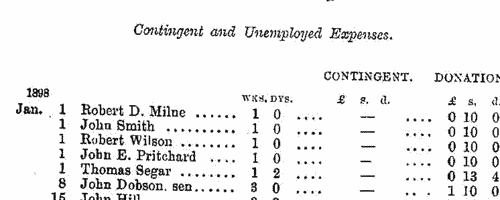
| Nottingham borough officers and officials
(1836-1900)
In 1956 this ninth and extra volume was added to the series called Nottingham Borough Records, containing precis of selections from the council and committee minutes for this period. CLEAVER. Cost: £4.00.  | Sample scan, click to enlarge
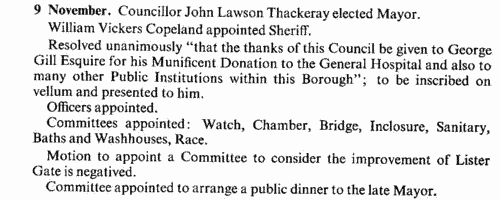
| Boys at University College School
(1860-1900)
In 1830 a school was set up adjoining the University and College of London on Gower Street; the school was enlarged from 1860 to 1876, and then removed to Frognal in 1907. In 1931 this register was published, listing all boys entering the school from Christmas term of 1859 to the summer entrants of 1931. The dates are abbreviated (98-01 = 1898-1901, &c.), each session being reckoned as beginning in September of one year and ending in the July of the next; the date of joining the school is indicated by the former, although it may fall in the latter, but the date of leaving by the latter, although it may fall in the former. Thus, if a boy came at any time during the Session 1863-64 and left any time during 1868-69, his date would be given 1863-69. The boys are listed alphabetically by surname, and then chronologically under each surname, full name being given where known. An asterisk * indicates that that particular boy lost his life in the Great War: in these cases, rank and regiment have been given where possible. Addresses as of 1931 are given where known. Italics in christian names or initials indicate that that particular boy was known, in 1931, to be dead. (a) (b) &c placed before christian names indicates brothers. In some cases occupation in later life is shown (A, artist; B, barrister; C A, chartered accountant; Ch, chemist; E, engineer; H C S, home civil service; I C S, Indian civil service; Med, physician or surgeon; M S E, member of the Stock Exchange; Mus, musician; Rev, minister of religion; S, solicitor). This is the index to those boys who were at the school in the period 1860 to 1900.CLEAVER. Cost: £4.00.  | Sample scan, click to enlarge

| Boys entering Giggleswick School
(1900)
The school at Giggleswick in the West Riding of Yorkshire dates from at least 1507, but no register of the boys attending there has survived earlier than one started by the headmaster, the reverend George Style, in 1875. When the bursar, H. L. Mullins, prepared this, 'The Giggleswick School Register', printed in 1913, he was able to compile general details of some scholars from earlier years, but the concerted, reasonably complete, account starts in 1859. The details are arranged by term of entry, then alphabetically by surname and christian name. Typically each description gives full name; date of birth; name and address of father; date of leaving. Where known, Mullins then added a brief career synopsis, present address in 1913, or date of death. From 1869 onwards boarders were admitted to the school, and where it is known that a boy was a day scholar, the word (Town) is added after his name.CLEAVER. Cost: £4.00.  | Sample scan, click to enlarge
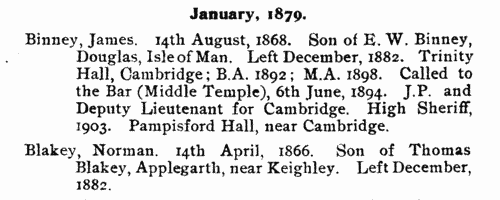
|  Outstanding soldiers of the Rifle Brigade (The Prince Consort's Own)
(1881-1901) Outstanding soldiers of the Rifle Brigade (The Prince Consort's Own)
(1881-1901)
Each year the best soldiers of the brigade were chosen for long service and good conduct medals. This register gives rank, name, regimental number, and date of recommendation. (The sample scan is from the East Surrey regiment). The register is essentially a register of recommendations, annotated with details of the issue of the medals. Where no gratuity accompanied the medal, the entry is marked 'W. G.' (without gratuity); where, for one reason or another, the medal was not issued, the entry is marked 'N. S.' (not sanctioned) and struck through. The rifle depot was at Winchester. There were four line battalions. The 1st battalion embarked for Bombay in 1880, and by 1885 was based at Belgaum. From 1885 to 1888 it served in Burma (adding "Burma, 1885-1887" to the regimental honours), returning to India before being sent (in 1894) to Hong Kong. In 1896 the 1st battalion was moved to Singapore, returning to England in 1898, and then being sent to South Africa ("South Africa, 1899-1902", "Defence of Ladysmith", "Relief of Ladysmith"). The 2nd battalion returned from Gibraltar to Ireland in 1880, moved to England in 1885 and was stationed at Aldershot; having served again in Ireland 1890 to 1895, it was sent from England to Malta in 1897, and to Crete and Egypt in 1898, taking part in the Soudan campaign ("Khartoum"). It was transferred to South Africa in 1899. The 3rd battalion was sent from Ireland to England in 1882, and in 1885 was at Aldershot; at the end of that year it was moved to Gibraltar; back to England in 1886; and embarked for Egypt 19 October 1887; went on to South Africa in 1888; and thence to India in 1889. In 1895 the 3rd battalion was serving at Rawal Pindee. The 4th battalion embarked for India 20 October 1873, and by 1885 was at Jhansi in Bengal; it was sent to Burma ("Burma, 1885-1887"), returned to England 27 January 1890, and in 1895 was at Aldershot. In 1896 the 4th battalion moved to Ireland, and in 1900 was sent to South Africa. CLEAVER. Cost: £8.00.  | Sample scan, click to enlarge
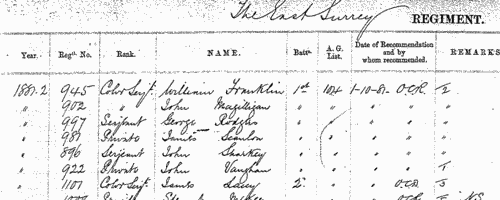
| Unclaimed Naval Prize Money
(1855-1902)
Various prize moneys were awarded to officers and men who served on board her Majesty's ships. For one reason or another a substantial number of these prizes, from as little as a shilling or two to as much as many pounds, remained undistributed by 1902, when this comprehensive list of the unclaimed moneys was printed: it lists unclaimed shares of prize money, slave and pirate bounties, salvage awards, parliamentary grants, gratuities and other moneys distributed by the Admiralty 1855 to 1902, but which omits moneys for service on the China Station during the war of 1856 to 1880, and special gratuities for service in Egypt (1882), Soudan (1884) and Soudan and Nile Expedition (1884-1885), for which there are separate indexes. In each case the sailor's name is given first (surname, then christian name or initials); rank or rating; ship in which serving at time of capture or award; and the amount due.CLEAVER. Cost: £6.00.  | Sample scan, click to enlarge

|  London Metropolitan Police
(1892-1902) London Metropolitan Police
(1892-1902)
The London Metropolitan Police Register of Joiners (MEPO 4/336) lists policemen joining the force 1 January 1892 to 23 June 1902 (warrant numbers 77319 to 88811). The register is alphabetical, in so far as the recruits are listed chronologically grouped under first letter of surname. It gives Date of Appointment, Name, Number of Warrant, Cause of Removal from Force (resigned, dismissed, promoted or died), and Date of Removal. A final column of 'Remarks' is largely blank, but occasionally gives an alias or a cross-reference to another warrant number.CLEAVER. Cost: £8.00.  | Sample scan, click to enlarge

|  British artillerymen fighting in South Africa
(1899-1902) British artillerymen fighting in South Africa
(1899-1902)
The Queen Victoria's South Africa Medal was awarded (after her death, in the event) to all who had served honourably in the various campaigns in the Boer War. Returns were made from each unit, and consolidated into nominal roll, of which this is the one for the Royal Artillery. Confusingly, the ledgers used had originally been printed for a register of men transferred (or re-transferred after mobilization) to 1st Class Army Reserve. All the original column headings were therefore struck through, and the roll was prepared with this information: Date of Issue; Regimental Number; Rank; Name; Unit; Medal (a 1 indicating that a medal was awarded); [number of] Clasps; the reference to the source in the original returns, usually starting with AG for papers in the hands of the Adjutant-General, and 68/Art/ for the Royal Artillery records. The final column, normally left blank, was occasionally used for explanatory remarks.CLEAVER. Cost: £8.00.  | Sample scan, click to enlarge
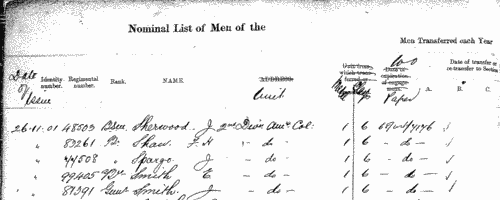
| Boys entering Marlborough College
(1902)
The public school at Marlborough in Wiltshire was founded in 1843. In 1952 this, 9th, edition of the college register was published, being a revision by L. Warwick James of the 8th edition (of 1936): but for the years before 1936 it does not merely repeat the 8th edition, because Warwick James was able to correct the 19th-century entries with information from newly-discovered letters and books from 1843 to 1853, and the school lists from 1844 onwards. The roll is arranged by year, and within each year by term of entrance, and then alphabetically by surname within each term. Each boy is assigned a number within the year: then his name is given, surname first, and, in brackets, his house. The houses within the college were called B1, B2, B3, C1, C2 and C3, and the Lower School (L Sch); the out college houses were Preshute, Priory, Cotton, Hermitage, Littlefield, Barton Hill, Summerfield and Upcot. Then there is given the boy's father's name (surname and initials) and address (at entrance), the boy's date of birth (b) and month of leaving (l). Where the boy represented the school at Rugby football (XV) or cricket (XI), in the rifle corps (VIII, or RC XI), that is indicated. There is a brief summary of achievements in later life, and, where known, and date of death or (in italics) address as in 1952. CLEAVER. Cost: £4.00.  | Sample scan, click to enlarge
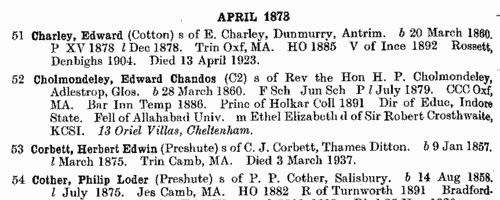
| Arrivals in Shanghai (1903)
The Missionary Journal in the Chinese Recorder lists births, marriages, deaths, arrivals and departures relating to Christian missionaries in China.
CLEAVER. Cost: £6.00.  | Sample scan, click to enlarge

|
Research your ancestry, family history, genealogy and one-name study by direct access to original records and archives indexed by surname.
|













